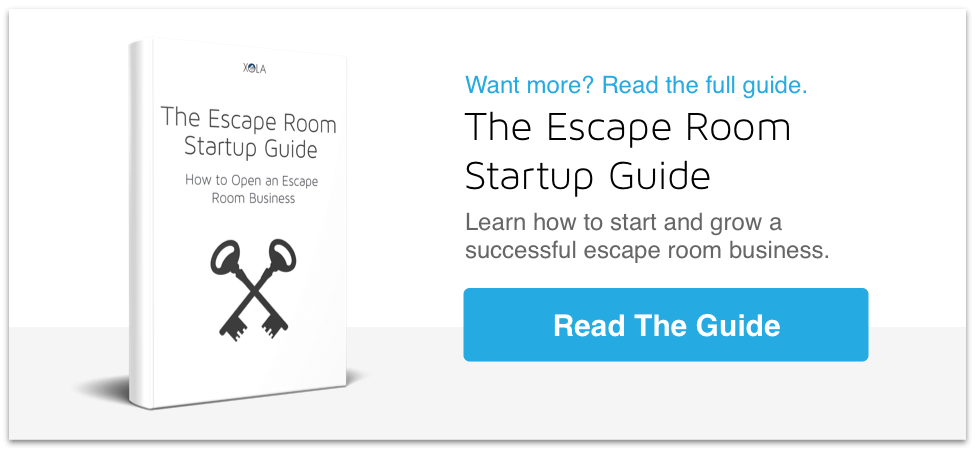
In just three years, the escape room industry grew from less than 100 to 2,000+ locations in North America.
But for every new escape room business that has emerged, others have failed. Some never made it to their opening day. Many others shut down within their first year or two.
People quickly discovered the truth: opening an escape room isn’t a guaranteed success. Like any business, they require an enormous amount of time, effort, and love to become successful and sustainable.
In other words, starting an escape room business isn’t for everybody. It’s hard work! But for the right kind of person it can be personally and financially rewarding.
We interviewed some of Xola’s most successful escape room customers and identified the eight most important considerations to make to answer the question: should I open an escape room?
1. Play a Lot of Escape Rooms (A Lot!)
If you want to start an escape room business, you need to play a lot of escape rooms first.
Every new room you play will improve your ability to design and run your own games. Playing other rooms will help you build better storylines and create more intriguing puzzles. They will show you creative ways to use props and innovative ways to apply new technology.
Even the bad experiences are worthwhile. They teach important lessons about what not to do. How not to treat customers, design games, or manage your rooms.
Try to vary the types of rooms you play. Try rooms with different themes. Ones with and without integrated storylines. Try low-tech and high-tech games.
Play local escape rooms whenever possible. They will give you a better understanding of your competitive landscape. They will help you determine what rooms are popular in your area, what themes or puzzles are overused, and how you can stand out in a crowded market.
Take the time to travel, too. Seek out a few locations with standout games, travel there with a group, and spend a weekend visiting and playing the rooms.
Regardless of where you travel, make sure you play a lot of rooms before spending too much time learning how to start an escape room business.
2. Talk to Owners
One of the biggest advantages of joining the escape room community is how helpful and inviting the community really is.
To grow the industry to where it is today, owners have relied on one another for support. In the early days, escape room owners were known to recommend their competitors’ rooms to their customers. Although these practices are less prevalent now, most operators are still happy to talk to aspiring owners about the ups and downs of starting and running an escape room business.
When Lori Harding, owner of The Escape Room Experience, was first considering starting her escape room business, she decided to approach a local owner.
“I wasn’t sure how it was going to be received… if I was going to be perceived as the evil competition or not.”
But Harding was pleasantly surprised. “She was super warm and friendly,” Lori remembers. “She was very forthcoming… [She] actually allowed us to play a second game on the house, gave us a tour, and answered any questions I had. She was very, very warm and welcoming, so I was very excited. That was my first impression of the industry.”
When you visit your local escape rooms, consider reaching out to the owners. If you’re concerned about reaching out to your direct competitors, consider approaching owners of escape rooms outside of your immediate area.
3. Join the Community
The escape room industry has a very active, welcoming and vibrant business community.
The community interacts most frequently on Facebook. They have 25+ different groups in North America dedicated to everything from room design to marketing and sales ideas.
For more in-depth information, there are dozens of publications, podcasts, and blogs (like this one) that are constantly dishing out new insight, interviews, and ideas.
4. Attend Conferences and Seminars
Escape room conferences are a must-attend if you want to stay up-to-date on the latest technology, room designs, and business practices.
Every conference is jam-packed with educational seminars. A large portion of the seminars are dedicated to helping prospective escape room owners start and run their business successfully.
Click here for a comprehensive list of escape room conferences and events.
5. Do Market Research
Most escape rooms are brick and mortar businesses, which means that they rely heavily on local residents and tourists for business.
That means location matters. A lot.
Conducting market research will help you answer questions like:
- What is the population of my area?
- How large is the tourist population? Where do they come from? What do they like to do while they’re here?
- What kind of people live in my area? What age? Gender? What are their interests?
- What other kinds of activities do people like to do for fun in my area? Where do they go to do them?
To get this kind of information, start online, and consider reaching out to your local chamber of commerce for additional resources.
6. Study Your Competitors
It’s important to consider your competitive landscape. In other words, how many other escape rooms are in your area? How full do they get on busy weekends and on slower weekdays?
Here too, we recommend you start online. You can quickly identify other local escape rooms by searching on Google, or checking online escape room directories (like this one compiled by roomescapeartist.com).
At Xola we calculated the “density” of escape rooms in each US state based on general population and number of locations. You can find our research here.
Consider doing competitive research in person, too. When you visit other local escape rooms, pay careful attention to the what kind of customers they serve. Try checking their booking availability on their website or monitor foot traffic over the weekend to get an idea of how full their rooms get at their busiest times.
7. Write a Business Plan
Writing a business helps you better define what, why, and how you plan to build and grow your escape room business. It will help you visualize what the business might look like, determine if it’s financially feasible, and decide if starting an escape room business is right for you.
You don’t have to have everything figured out yet. You’re still trying to figure out of opening an escape room business is right for you. But it’s important to have a clear idea of the feasibility of the business and how you might build it before making any personal or financial commitments.
Most business plans focus on 5 key elements:
- Executive Summary – The overview of your escape room business and plan. It should be short (ideally one page). Because it is meant to summarize the details of the entire plan, most people write it last.
- Opportunity – What is the market opportunity? What kind of rooms do you intend to build and sell? How are you going to stand out in a crowded market?
- Execution – How do you plan to build and run your escape room? This section often covers your escape room marketing strategy, operations, and how you’re going to measure success.
- Team and company – Who is part of your current team? (business partners, employees, contractors, etc.) What skills do they lend to the business that you do not have? What positions will you need to fill as you grow? This section may also outline your legal structure and location.
- Financial plan – A business plan isn’t complete without a financial forecast. This is often one of the more difficult sections to complete, since costs can vary widely between escape rooms. Things like rent, permit fees, insurance rates, and wages vary dramatically from place to place. Remember to also factor in room design and technology investments. They don’t just determine the quality of your games, they impact your budget.
8. Business or Hobby?
Before diving deeper into how to start an escape room business you need to ask yourself: am I committed to the demands of running a full-time business? Or is this just a hobby for me?
“A business isn’t a hobby,” Michael Hill of Limitless Escape Games warns. “If you’re actually making this your livelihood, you have to go all in to make it work.”
Of course, that doesn’t mean that you cannot enjoy it. Or that you shouldn’t put time, energy, and love into your room and game design. After all, your escape room business is only as good as the quality of your games.
But the responsibilities of being a business owner will dominate a majority of your time. You will spend a lot of time taking on roles you may have never expected, especially early on when you cannot afford extra staff. You’ll play the role of administrator, customer service rep, marketer, handyman, and janitor (those bathrooms aren’t going to clean themselves!) and many other roles besides.
When you make your final decision, it’s important that you are committed to spending the time, effort, and funds necessary to start, manage, and grow a successful escape room.
Conclusion
Running an escape room business isn’t for everyone. But for the right kind of person, it can be incredibly rewarding.
Before diving deeper into how to start an escape room business, become intimately familiar with escape room games. Play as many rooms as possible, and talk to the owners to get a better idea of what the business entails.
Join the community online and in-person. As you become more familiar with the industry, spend some time doing market and competitor research to understand the opportunities and challenges of opening an escape room in your area.
With those considerations in mind, you can begin to create your escape room business plan to help you visual how you intend to build and grow your escape room business.






